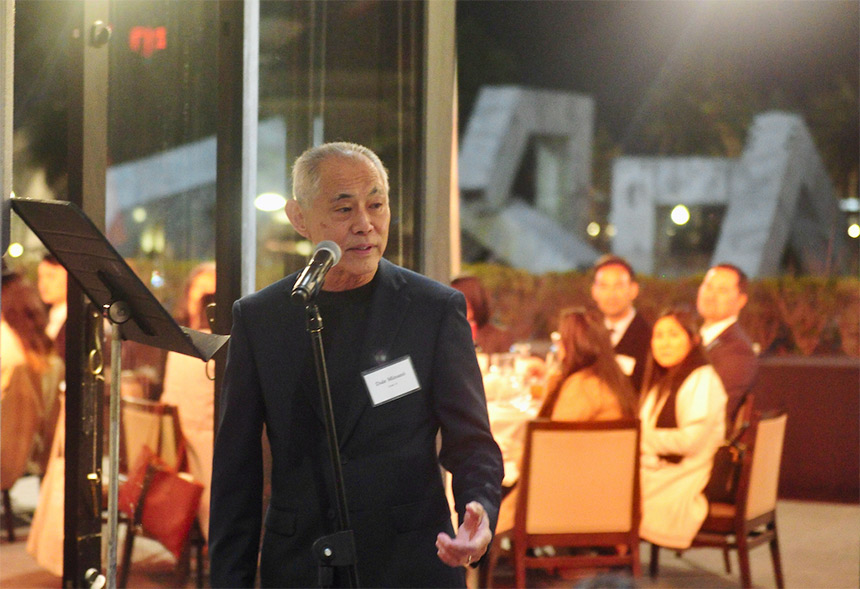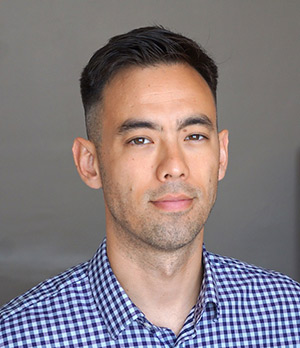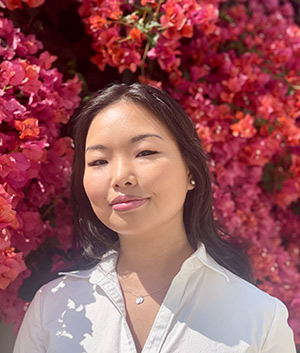
By Andrew Cohen
It started with three core goals: Connect Berkeley Law’s Asian and Pacific Islander (API) alumni, honor deserving graduates, and provide financial support to public interest attorneys. Now, 16 years later, the Dale Minami Public Interest Fellowship has become so much more.
“We’ve had 1Ls make connections with people at firms that led to job offers, connections from different classes that led to lateral movements and in-house offers, and many friends that tend to see each other just once a year at our annual gala,” says Bryan Springmeyer ’10, who became involved as a student and has helped ever since. “Similar to myself, I’ve heard from others that they were inspired by their first gala to become more active in the community.”
After graduating from Berkeley Law in 1971, Minami became one of the school’s most esteemed alumni, litigating major lawsuits to enforce civil rights and pursue social justice for Asian Pacific Americans and other minorities. That list includes a leading role on the legal team that overturned Korematsu v. United States 40 years after the Supreme Court upheld a conviction for refusing to obey exclusion orders aimed at Japanese Americans during World War II.
Co-founder of the Asian Law Caucus, one of the nation’s first nonprofit firms dedicated to API advocacy, Minami has strengthened the Bay Area’s API legal community in several ways. He helped start the Asian American Bar Association of the Greater Bay Area, the Asian Pacific Bar of California, and the Coalition of Asian Pacific Americans, and continually engages with and devotes time and resources to community organizations and individuals.
So when Berkeley Law Asian Pacific American Law Students Association (APALSA) chapter and Class of 2009 members Vina Ha, Eunice Koo, and Daniel Kim hatched the fellowship idea in 2007 APALSA, Minami was intrigued — but also skeptical.
“I was a bit taken aback as the call came out of the blue and I didn’t know how or why they chose me,” he recalls. “Students can easily lose interest in a project and many would not even know who I was in a few years. So my thought was that they could help some students for a few years, then we’d all go away.”
Driven by students
The first gala was held in early 2008. Rather than go away, it has steadily risen in popularity.

Springmeyer planned the second gala as a 2L and helped transition new event chairs the next year. And when Ha, Koo, and Kim moved away from the Bay Area after graduating, he filled the role of program director. Springmeyer and Ha, who has since moved back to the area, now lead the operation together.
“I didn’t envision the longevity nor interest generated, but 16 years later we’re still celebrating and giving grants,” Minami says. “It’s all due to the wise stewardship and leadership of Bryan Springmeyer and Vina Ha, and the work of the student co-chairs who have kept producing this fundraiser.”
Springmeyer and Ha support the event’s logistics (working with sponsors, providing oversight, and handling all of the other operations of a nonprofit) while current APALSA students plan the theme, speakers, alumni honorees, and award recipients. It’s become a fun way for classmates to stay connected — they often form tables of friends from a particular graduating year — and for different generations to get to know each other. Held on Feb. 24, this year’s gala will honor California Magistrate Judge Donna Ryu ’86 and MacArthur Justice Center Supreme Court & Appellate Counsel Easha Anand ’14, and give the annual fellowship award to 3L Myka Yamasaki. Those interested can register for the event here.
Leading student initiatives focused on Native Pacific Islander rights and the creation of a 9th Circuit pro se immigrant guide, Yamasaki will join the Legal Aid Society of New York as a criminal defense attorney after graduating.
Joining the fight
“I think that the Dale Minami Fellowship is an amazing program for the API community in that it symbolizes the importance of our presence and voices in social justice work,” Yamasaki says. “I feel affirmed in my decision to pursue public interest law knowing that esteemed members of the community want to support students like me.

“I recently saw Dale and his colleagues speak at the Asian American Law Journal symposium and left thinking about how they paved the way for us when there were even fewer API public interest attorneys, and how the fights they have fought are ongoing and interconnected to injustices that other marginalized communities are facing. I feel very grateful to have been selected for this honor in his name.”
Minami says there were just five API students in his law school class and six the year after. “With Affirmative Action and the law school’s strong commitment to diversity,” he says that number rose to 23 the following entering class.
“When I learned that API students increased dramatically over the years, I felt an alumni group could assist each other to overcome some obstacles in getting employment, support community and progressive causes, and engage with Berkeley Law as part of a larger multicultural and racial mosaic of such a great institution,” Minami says. “The fellowship’s annual dinner is part charitable, part reunion, part celebration of Berkeley Law and part party. It reaffirms our connection to Berkeley Law and each other.”
Happy to help public interest minded students with their debt, Minami recalls paying just $342 per year for tuition.
“It’s now challenging to fulfill your dreams of practicing public interest law because of the financial deterrent,” Minami says. “So anything we could do to encourage students to enter this critical area of social justice work is fulfilling to me.”